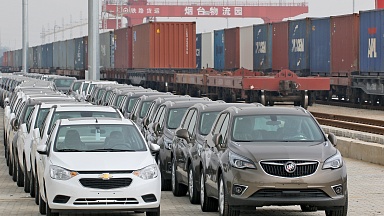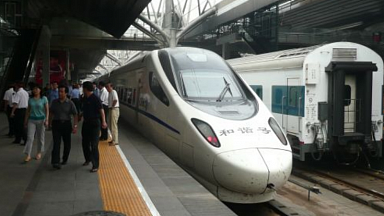Navigating the Tension: China’s Roles in Europe as Partner, Competitor, and Rival
China’s economic dominance in Europe has skyrocketed in the last two decades, shaping the financial landscape of the continent: in 2022, China was Europe’s largest partner for imports of goods (20.8 %), and the third largest partner for EU exports of goods (9 %), preceded by the United States (19.8 %) and the United Kingdom (12.8 %). But Europe faced an enormous trade deficit (€36 billion) with China in September 2022, which later fell to €27.4 billion in December 2022.
Economics has emerged as the primary engine of modern-day geopolitics. Inextricably intertwined, countries today wield their financial might to craft foreign policy objectives and gain an upper hand in global affairs.
Hence, geopolitics and geo-economics serve as contributing factors to why the European Union characterized China as a negotiating partner, economic competitor, and systemic rival in 2019, a testament to the gravity of the global challenges posed by China’s ascent. This declaration signaled the EU’s intent to deepen ties with China while simultaneously acknowledging Zhongnanhai’s status as a geopolitical adversary in a rapidly shifting multipolar global order. Yet, navigating the EU’s complex decision-making processes has proved to be a herculean task.
The EU originated as a means to counteract nationalism and promote mutual understanding via trade policies, becoming a prominent soft power. Over time, it grew from six to 27 member states and evolved into a formidable global economic force. However, despite an impressive economic clout, the EU now tries to avoid becoming a mere economic vassal, beholden to China’s geopolitical and economic influence. Europe’s relative lack of impact vis-à-vis China is a stark reminder of the shifting sands of the global order, where economic force increasingly determines strategic advantage, and soft power alone is no longer sufficient to secure anyone’s interests.
Furthermore, regardless of the positive language expressed in the third Policy Paper on the EU (2018), China’s pursuit of greater influence in Europe has been marked by a strategy of circumventing institutional frameworks, forging bilateral deals related to the Belt and Road Initiative with 15 EU member states, and creating alternative alliances such as the 14+1 mechanism with Eastern European countries. This approach, which exploits Europe’s vulnerabilities and governance fissures, underscores the potency of economic leverage in shaping international relations.
The Ambiguous Position of Europe in the China-U.S. Rivalry
In addition, the EU has also faced mounting challenges from the U.S. over the past decade. In fact, as early as 1997, Brzezinski cautioned that a strong and united EU could become a global adversary to the U.S., ultimately leading to conflicting geopolitical interests — a prediction that later became official U.S. policy. While the EU and U.S. had long shared security objectives through NATO, both Obama’s «Pivot to Asia» and Trump’s presidency have upended this partnership, leaving the EU overlooked. The EU had hoped for better relations with Biden, but American hardliners have been unwilling to engage in meaningful discussions, rather the contrary.
As a result, the EU is struggling to maintain a balance between the U.S. and China in the current geopolitics. While the U.S. has adopted an aggressive economic stance with policies like «America First,» «Made in America,» and the Inflation Reduction Act, the EU has attempted to strengthen ties with China through the Comprehensive Agreement on Investment (CAI). The objective is to ensure fair competition for EU companies and prevent discriminatory practices. However, ratification has been delayed due to escalating tensions: The U.S., wary of the EU-China partnership, has placed the EU in a precarious position of balancing the competing economic and political interests of both superpowers.
Since then, the situation has worsened, rather than improved. Despite the EU’s initial openness to Chinese trade and investments, European companies still encounter robust barriers within the Chinese market. Furthermore, Xi’s recent policy shift towards self-sufficiency and balancing «security and development» over the «economic development first» may make it more challenging to meet the terms.
As if that were not enough, the war in Ukraine has further complicated the delicate balance of power and put a strain on global relations. Mearsheimer’s «American pacifier» concept seems like a distant memory as the U.S. takes a more proactive role in defending Ukraine and building alliances with Western forces, primarily to impose sanctions on Russia. In contrast, China is starting to emerge as a peacemaker, promoting understanding in Ukraine (February 2023) and brokering a détente between Saudi and Iran (March 2023). Amid these competing forces and foreign policy shifts focused more on security than the economy, the EU must traverse a narrow path, balancing its partnerships with both giants to promote global cooperation and stability. As a result, the EU’s position has so far remained ambiguous, underscoring the need for careful and nuanced diplomacy.
EU’s Recipe to U.S.-China Assertiveness: Strategic Sovereignty
The EU’s ambition for «strategic sovereignty» is focused on achieving long-term objectives and enhancing global presence, yet the idea of increased federalism and delegation of power to the institutions is met with resistance from some member states. Even still, recent agreements such as the 2021-2027 EU budget and the «NextGenerationEU» post-pandemic recovery plan indicate a move towards deeper integration. Both CAI and the EU Indo-Pacific Strategy are steps in that direction as well. Furthermore, Ukraine has been a catalyst for greater unity, enabling the EU to become more confident and assertive.
Nevertheless, the EU’s aspiration to become a dominant global force has yet to demonstrate the necessary political will, leadership, or collective defense strategy to achieve it. The task of formulating a united military doctrine has proven to be a formidable challenge, and the process for creating an autonomous European defense structure outside of NATO is still uncertain. As early as 2012, Kaplan noted that a united Europe with a single foreign policy and military could rival the U.S., yet the current situation shows that individual member states still retain control over their own military, leading to inefficiencies and wasteful spending, notwithstanding the EU’s combined military budget ranking as third largest in the world.
Strengthening the EU’s Interdependent Foreign Policy
The power shift from West to East has created uncertainty in Europe, which could be balanced by a more proactive and independent EU foreign policy, avoiding introversion and strengthening interdependence with other major powers. The EU must, simultaneously, maintain NATO’s security umbrella while strengthening its common defense, becoming a more autonomous and influential geopolitical power through internal cohesion.
Trade may be a EU geopolitical tool to transform economic interests into statecraft opportunities, and deeper understanding with China and India and other like-minded allies such as Japan and South Korea to expand coalitions. By leading with strategic sovereignty, the EU should turn stronger, less reliant on individual member state’s views, and become a balancer in the China-U.S. Cold War.
Europe’s apprehension towards China is not limited to human rights concerns. It mostly stems from Beijing’s growing control over crucial infrastructure and strategic sectors, as well as Europe’s reliance on Chinese digital networks. The EU should engage on multiple fronts, including artificial intelligence, supply chains, the digital economy, disruptive technologies, and climate change. It is imperative that an assertive and proactive EU approach to ensure that these partnerships are mutually beneficial and protect European sovereignty and security.
Ultimately, Europe does not share the same level of concern about China as the U.S. or other Asian countries, nor does it have the conditions for involvement in a conflict. Therefore, the U.S. strengthening of its defense alliance scheme could have the unintended consequence of reinforcing the EU-China relationship beyond just trade, as evidenced by current debates about the future CAI entry into force and multiple EU leader’s visits to Xi. For a successful association, China should act more like a partner than a competitor or systemic rival and increase mutual cooperation, while respecting Europe’s relationships with other superpowers, namely the U.S.


